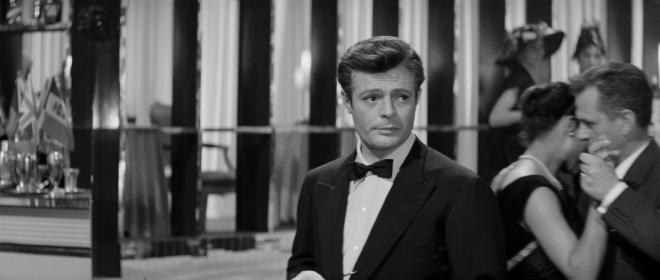← Back to Reviews
in
The above line is uttered by an artist, almost inadvertently, during a party showcased during the middle "episode" of Federico Fellini's La Dolce Vita. But the relevance of that line and that philosophy is central to the film, which follows journalist and womanizer Marcello (Marcello Mastroianni), as he navigates through Rome's nightlife and lifestyle of the rich and famous.
The film's story, which is split into seven separate vignettes, is said to represent the Seven Deadly Sins, or the Seven Hills of Rome, or the Seven Sacraments of the Catholic Church. But while I try to make sense of all those symbolisms, on the surface the film features Marcello struggling with his relationship with volatile fiancée Emma (Yvonne Furneaux) as he also goes about his job as a gossip columnist and socialite, while mingling with celebrities and wallowing in the excesses of sex and drinking.
However, deep down Marcello craves a more meaningful life. He confesses as much to his friend and role model Steiner (Alain Cuny), who as opposed to Marcello, enjoys "partying" with intellectuals, poets, and philosophers instead. It is at this party that we hear the above quote, and up to this point, we've already seen Marcello flirt, engage, and possibly more, with sunbathers, a prostitute, a wealthy heiress (Anouk Aimée), and an actress (Anita Ekberg), not to mention Emma.
For the rest of the film, Marcello continues his descent as he visits a nightclub, an aristocrat party, and a decadent party in a beach house. He's restless, burning, as if constantly looking for something, anything to distract him or take him out of a life he doesn't want, while longing for a life that might not be as good as he thinks. Should he "freeze" or "burn" himself?
Marcello is a tough character to analyze. He's not entirely likable; after all, he's a womanizer, he's unfaithful, and has outbursts of violence and excesses. Putting aside whatever symbolisms each may have, to see every single woman he meets fall at his feet also made me roll my eyes often. But anyway, to add to his complicated persona, Marcello also works at a job that's not the most liked. Still, as a middle-aged man myself, I can't help but sympathize with his search for meaning and purpose, even if I disagree with the ways he goes about it.
At the end of the film, Marcello doesn't seem to be any more closer to finding out about his life as he was at the beginning of the film, but he does seem to be more at peace with just not knowing where "the sweet life" will lead him.
Grade:
LA DOLCE VITA
(1960, Fellini)
A drama film

(1960, Fellini)
A drama film

"The great thing is to burn, and not to freeze."
The above line is uttered by an artist, almost inadvertently, during a party showcased during the middle "episode" of Federico Fellini's La Dolce Vita. But the relevance of that line and that philosophy is central to the film, which follows journalist and womanizer Marcello (Marcello Mastroianni), as he navigates through Rome's nightlife and lifestyle of the rich and famous.
The film's story, which is split into seven separate vignettes, is said to represent the Seven Deadly Sins, or the Seven Hills of Rome, or the Seven Sacraments of the Catholic Church. But while I try to make sense of all those symbolisms, on the surface the film features Marcello struggling with his relationship with volatile fiancée Emma (Yvonne Furneaux) as he also goes about his job as a gossip columnist and socialite, while mingling with celebrities and wallowing in the excesses of sex and drinking.
However, deep down Marcello craves a more meaningful life. He confesses as much to his friend and role model Steiner (Alain Cuny), who as opposed to Marcello, enjoys "partying" with intellectuals, poets, and philosophers instead. It is at this party that we hear the above quote, and up to this point, we've already seen Marcello flirt, engage, and possibly more, with sunbathers, a prostitute, a wealthy heiress (Anouk Aimée), and an actress (Anita Ekberg), not to mention Emma.
For the rest of the film, Marcello continues his descent as he visits a nightclub, an aristocrat party, and a decadent party in a beach house. He's restless, burning, as if constantly looking for something, anything to distract him or take him out of a life he doesn't want, while longing for a life that might not be as good as he thinks. Should he "freeze" or "burn" himself?
Marcello is a tough character to analyze. He's not entirely likable; after all, he's a womanizer, he's unfaithful, and has outbursts of violence and excesses. Putting aside whatever symbolisms each may have, to see every single woman he meets fall at his feet also made me roll my eyes often. But anyway, to add to his complicated persona, Marcello also works at a job that's not the most liked. Still, as a middle-aged man myself, I can't help but sympathize with his search for meaning and purpose, even if I disagree with the ways he goes about it.
At the end of the film, Marcello doesn't seem to be any more closer to finding out about his life as he was at the beginning of the film, but he does seem to be more at peace with just not knowing where "the sweet life" will lead him.
Grade:
